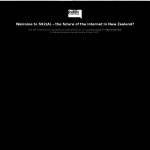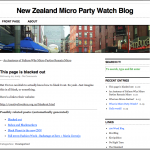Now that the Green Party has matured into the third most important political party in NZ, it is time that it develop an equally robust foreign policy stance that moves beyond its visceral commitment to pacifism, human rights and civil liberties, international ecological defence and anti-imperialism. Although laudable goals that still have a place on the Green foreign policy agenda, these foundational pillars need to be supplemented by a more nuanced and less ideologically rigid, but no less idealist in principle, approach to New Zealand’s foreign affairs.
Lets start with defence and intelligence. The Green Party should maintain their absolute commitment to conventional and unconventional weapons non-proliferation, nuclear disarmament, prohibitions of chemical and biological weapons and bans on the manufacture and sale of land mines and other indiscriminate munitions. It should maintain its commitment to seeing the NZDF externally focused on peace-keeping and nation building as its major priority. It should resist efforts to turn the NZDF in to a mini Australian armed forces, and resist the calls for the NZDF to follow Australia, the US and the UK into battle no matter the context or justification. But it also has to realise that NZ’s own defence is premised on its being a good international security partner, and that it cannot abrogate its responsibilities in that field. To that end, the Greens should support efforts to restore a close air/ground support wing to the NZAF in order to provide NZ peace-keeping troops with independent air cover in foreign conflict zones. Even when under multinational military control such as the ISAF mission in Afghanistan, military protocols allow services of each country to protect their fellow troops as a priority. If NZ is going to continue its level of international troop deployments in conflict zones like Afghanistan, East Timor, the Solomons and elsewhere, the ability to provide protective air cover to its troops on the ground is surely a worthy cause. And, as it turns, out, be they rotary or fixed wing, surplus close air support platforms in the inventories of several NATO and other countries come relatively cheap when compared to the aborted F-16 purchase of a decade ago.
Likewise, the Greens needs to support the reinforcement of the Navy’s long-range patrol and interdiction capability, if for no other reason than to protect the resources located in the NZ Exclusive Economic Zone and to deter illegal poaching of whale and endangered fish in the waters adjacent to it. Moreover, such a capability can also serve in anti-piracy roles in the sea lines of communication most vital to new Zealand’s trade, and to keep track of the increasing presence of foreign submarine and surface fleets in and around New Zealand waters. Passivity in the face of such probes will likely be interpreted as acquiescence or inability to counter them, which will encourage further encroachments into the EEC, if not the territorial limit itself. That is also why the Greens need to support the continuing emphasis placed on the NZSAS as the country’s special operations branch. What it can do differently is question the deployments they undertake on behalf of foreign powers, perhaps broadening the scope of their activities to areas outside of the usual SOLIC (special operations and low intensity conflict) scenarios.
 Thus, the Greens should support efforts to increase NZDF spending to  1.5 percent of GDP, in line with the lower threshold of OECD nations, but with a specific focus on the Green “line” of defense and security priorities. No more over priced and ill-suited LAVs, no more $1 million-a-copy anti-tank shoulder fired rockets–just the best weapons and platforms for the NZDF’s unique “niche” role in international security affairs. Even if coat-tailing on previous Labour initiatives, a neo-realist Green approach to defence can provide a human security orientation that extends beyond the traditional security concerns of the major parties.
With regard to intelligence, the Greens must continue their valiant opposition to the unaccountable and often rogue behaviour of  the NZSIS and Police intelligence. But it must couple its demands for more democratic accountability and transparency–something that may begin with the appointment of Russell Norman and Tariana Turia to the Parliamentary Security and Intelligence Committee–with a more reasoned demand that external intelligence collection be separated from domestic intelligence collection and delegated to different agencies. Counter-intelligence functions can be shared because foreign espionage often follows commercial and criminal avenues, but the business of spying in foreign places is very different than spying on one’s own citizens. Thus the Police should be responsible for the latter, with all of the attendant legal safeguards that purportedly govern their operations, whereas the NZSIS can limit itself, along with the GCSB, to external intelligence collection and analysis. No other political party has even mentioned this, much less understood the multiple rationales as to why decentralisation of intelligence functions is actually an important step towards removing the authoritarian culture so deeply imbedded in New Zealand’s intelligence apparatus. In line with these reforms, the Greens should demand that the PSIC be elevated to the status of select committee allowed to review classified material in closed session. Only then will real parliamentary oversight of the intelligence apparatus be possible.
In terms of trade, the Greens need to modify their generic opposition to trade. Instead of a seeming blanket opposition to open economies, the NZ Green Party needs to understand that for a vulnerable isolated and resource-scarce country like NZ, trade is a lifeline. It is here to stay as the mainstay of macroeconomic policy. Therefore, the issue should not whether to trade or not to trade, but how to trade? The answer, as I have mentioned in previous posts, is to trade fairly as well as (or as opposed to) freely. Trading fairly means to concentrate not just on tariff reduction and other bi-or multilateral entry conditions, but on after-entry conditions pertinent to labour rights, working conditions, gender and indigenous issues, wages, health, safety and environmental standards. The goal is to promote a level of regulatory symmetry n the trade relationship, thereby leveling the playing field or at least standardising the rules of investment and competition in the interest of productivity, growth AND human dignity in the labour process. This is as true for NZ investment abroad as well as foreign investment in Aotearoa. The basic thrust is to do onto other (foreign) laborers as what one would do onto oneself (or one’s co-nationals). Capitalists may not like the impact on their short-term profits of promoting such trade agreements, but it is in their longer-term interests, in terms of a guaranteed restrained rate of profit, that they play fair and symmetrically. Moreover, such a stance places NZ at the forefront of trade debates that emphasize a balance between profit, growth and larger communitarian considerations.
Diplomatically, the Greens need to promote a strengthened constructivist-institutionalist approach to foreign policy. Constructivism in foreign policy is focused on normative value change in key policy areas (say, human rights and disarmament) Â and institutionalism is focused on strengthening multilateral institutional approaches to conflict resolution and global peace and stability based on shared ideals. Â Although Labour advocated such an approach, it too often has compromised its stance in order to curry favour with trade or defence partners. National has no commitment to idealism in foreign affairs. Thus it is left for the Greens to push hardest for an ongoing, if not increased commitment to finding multilateral institutionalised approaches to the sources of international disputes, and to push for progressive value change within international organisations and regional institutions. In doing so it will help continue New Zealand’s reputation as an honest international broker, mediator and arbitrator committed to supra-and transnational methods of grievance redress and resolution. After all, if the world is truly to move away from the anarchic” state of nature” that is the realist conception of international affairs, it needs to move beyond the nation-state as the ultimate adjudicator of international disputes. It is up to small countries to make the case. It is their self-interest to do so, and that is eminently realist in conception. It is, in other words, a bit of Green (neo) realism at play.
All of this is a big task and may run counter to the wishes of more militant elements in the “watermelon” constituency of the Green Party (which should be seen as a source of strength rather than as a weakness). Now is the time to move beyond the parochial environmentalism, classism and other foundational Green principles and towards an agenda that attracts more mainstream voters in pursuit of being a legitimate swing vote and therefore real power broker in the New Zealand political system. This foreign policy manifesto is a gesture in that direction. That does not mean abandonment of  the foundational principles, but the enhancing and expanding of them. This is important because only the Greens have the ability to contribute significantly to a shift in the status quo political discourse currently on display. No other party does.
 After all, with ACT having prostituted its libertarian principles to the crime and punishment authoritarians headed by Mr.Garrett (see Lew and Anita’s posts on the issue  below), the Greens are the only honest political party left in parliament–with them, what you see is what you get, full stop. Given that unique position of advantage, now is the time for the Green Party to develop more depth to their policy agenda, which is why this post is tabled.







